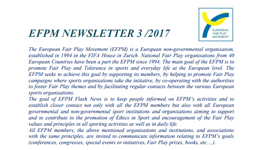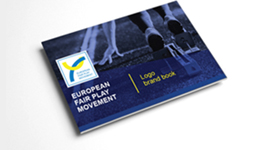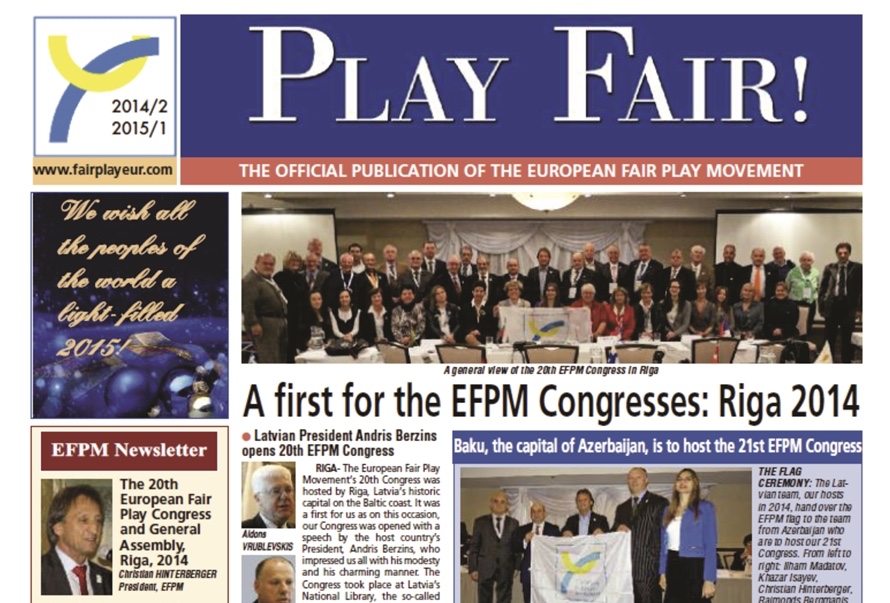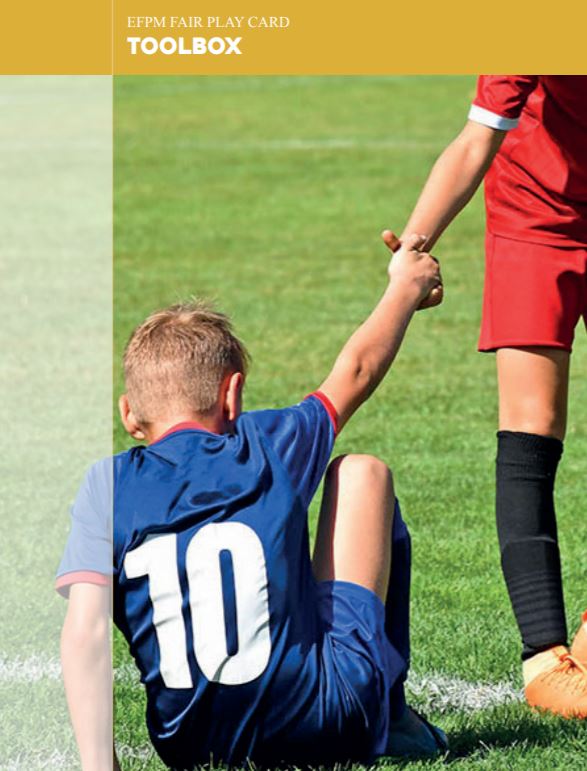Statutes of awards
In 1996, the EFPM established the European Fair Play Awards, which aim to promote the principles of fair play across Europe. The Awards convey an important message about fair play on the pitch and in society, encouraging stronger citizenship for us all in the future. The purpose of these Awards is to recognize people who at an important crossroads, be it in sports or private life, choose the right path. The Awards honor individuals, organizations, or entities for their outstanding contribution to Fair Play, demonstrated through behavior, action, or advocacy.
1. European Fair Play Awards, made under the patronage of the European Olympic Committees
Eligibility
These Awards will be given annually in the following two categories:
1.1. The European Fair Play Plaque of Merit and Diploma, which is to be
awarded to:
• A national Fair Play organisation, or a sports organisation at an educational institution, for the contribution this organisation has made to the dissemination of the values and principles of Fair Play and tolerance, and/or the support this organisation has given to appropriate initiatives for the preservation and dissemination of ethical values in sport;
• An individual, either: for her/his personal contribution to, and/or services rendered to,
– the implementation of ethical values in sport;
– the development of a national Fair Play organisation;
– the education of young people or athletes in the spirit of Fair Play and tolerance;
– the study and better understanding of ethics in sport;
or: for making an outstandingly sportsmanlike gesture or acting in an outstandingly sportsmanlike manner during a sports event.
A maximum of one European Fair Play Plaque of Merit and Diploma will be awarded in each of the two categories listed above (i.e., a maximum of one for an organisation and one for an individual).
1.2. The European Fair Play Diploma, which is to be awarded to:
an organisation, as defined in paragraph 1.1 above, or to an individual, in consideration of a relevant contribution made by this organisation or individual to the preservation or implementation of ethical values in sport.
The number of European Fair Play Diplomas to be awarded will be determined by the Awards Committee. A maximum of two will be given annually, depending on the quality of applications received.
The Submission Process
Applications for all the above categories of Award may be made by:
• a national Fair Play organisation;
• a European Olympic Committee; or
• a member of the EFPM Executive Committee,
and must be submitted to the EFPM Secretariat so that it reaches the Secretariat before the deadline, which is to be fixed by the EFPM Executive Committee for each year.
The Decision-Making Process
Decisions as to which persons, groups or institutions are to receive the above- mentioned Awards will be taken by the EFPM Awards Committee, and will be announced at the annual General Assembly of the EFPM.
The Awards will be presented by the EFPM during the annual EFP Congress – or by the organisation that has submitted the relevant proposal, at its seat.
2. The EFPM ‘Spirit of Fair Play’ Award
Eligibility
The EFPM ‘Spirit of Fair Play’ Award may be given to a team, club, sports federation, public or private institution, organisation or group of spectators / fans / individuals in recognition of the following:
• Projects and campaigns designed to prevent discrimination and violence of all kinds;
• Projects and campaigns which use sport as a tool for positive social change, social integration and the breaking down of barriers;
• Acts of fairness on the part of players, fans, officials, etc. towards competitors, organisations, etc., which take place during or in connection with sports competitions;
• Exemplary behaviour maintained over a long period, and commitment to fairness on or outside the sports field;
• Developing and carrying out projects or campaigns which aim to encourage sportsmanship, exemplary behaviour and the principles of Fair Play;
• Developing and carrying out projects or campaigns which aim to combat child labour and to protect the rights of workers producing Olympic goods and sportswear;
• Work carried out with children and young people which aims to educate them in subjects such as Fair Play, tolerance and the discouragement of discrimination, and to help them better understand these values.
The Submission Process
Proposals may be submitted by individuals, by sports federations, or by public or private institutions.
A report describing the event concerned (in the form of a written document, accompanied by photographs, videos and if necessary other relevant supporting material) confirming the realisation of the project and providing reasons for the making of an Award should first be sent via e-mail to Ioannis Psilopoulos, EFPM General Secretary, at the following address: ipsilopoulos@windtools.gr
If submitted in a language other than English, the said report must include a brief English summary.
A written version of the initial report (accompanied by photographs, videos and if necessary other relevant supporting material) should then be sent by post to Ioannis Psilopoulos, EFPM General Secretary, at the following address: 31, Kodringtonos Str., GR-10343 Athens, Greece.
The deadline for submissions to reach the EFPM General Secretary is 31st March in each year.
Self-nomination is permitted.
The Decision-Making Process
Decisions as to who will receive EFPM ‘Spirit of Fair Play’ Awards will be taken by the EFPM Awards Committee, and will be announced at the annual EFPM General Assembly. The making of Awards in this category is entirely at the discretion of the EFPM. Awards will be made only if the Awards Jury receives suitable proposals on behalf of candidates who are considered by this Jury to be worthy of an Award.
3. The EFPM ‘Fair Play Flame’ Award
The target group for the EFPM ‘Fair Play Flame’ Award is young people up to the age of 18 (this figure being calculated according to the year in which the candidate turns 18).
Eligibility
The EFPM ‘Fair Play Flame’ Award may be given to a team, class or individual for any of the below-listed or similar accomplishments, all of which are designed to have a positive influence on society or on the environment:
• Exemplary behaviour or acts of Fair Play during sports competitions;
• Helping friends or schoolmates who are in trouble, either at school or elsewhere;
• Helping to organise cultural or sports events, or events designed to assist orphanages, homes for the handicapped or homes for socially-deprived children;
• Helping elderly people who are in need of





